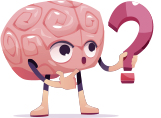Epilepsy and the brain
Your brain is made up of billions of tiny nerve cells. These cells send messages to one another and to other parts of the body. Nerve cells in different parts of the brain control different parts of the body. For example, some cells send messages to the arms and legs. Others to the eyes and ears. Your brain sends a message to your foot to kick the ball when you play football, or to your hand when you want to answer a question in class, or even makes you smile when you meet a friend.

When you have epilepsy, the nerve cells sometimes become over active and send messages without you wanting them to. When this happens, you have a seizure. Having a seizure is a bit like getting lost in a maze. From time to time, nerve cells in the brain get confused or become over active for a while, and send the wrong messages to other parts of your body.
Seizures
There are various types of seizures. During a seizure, the person may stare blankly, blink, be afraid, be dizzy, fall and twitch. A seizure is a bit like sneezing. It cannot be stopped. It lasts from several seconds to several minutes and is not painful.
What causes seizures?
Worldwide people of all ages have seizures. Epilepsy is not a disease that you can catch from someone else. It is a condition that causes a person to have seizures. Many causes can bring one on. Sometimes a cause cannot be found.
Hobbies and friends
Les personnes qui sont atteintes d’épilepsie peuvent participer à presque tous les sports et loisirs. Ils peuvent s’amuser autant que leurs amis.
Si tu as une épilepsie, en parler à tes amis les aidera à te comprendre et ils n’auront pas peur si tu fais une crise. Cela les aidera aussi à savoir quoi faire si tu as une crise en leur compagnie. Tout le monde peut faire une crise ; avoir l’épilepsie veut dire que tu fais plus d’une crise.
Preventing seizures
Some things increase the risks of seizures in people with epilepsy. These are called seizure triggers. When you know that something is likely to trigger a seizure, you can try to avoid it. So, if a person with epilepsy does not get enough sleep, there is a greater chance of having a seizure. It is important for people with epilepsy to :
- always take their medicine as prescribed;
- get enough sleep;
- not skip meals;
- avoid any situation that causes tension;
- And for people with photosensitive epilepsy, avoid flickering lights, such as those on computers or televisions.
Help
There are some things that you can do to help someone who is having a seizure. Most seizures only last a few seconds or minutes. Sometimes, the person will be a bit tired or confused after a seizure.
Some tips for helping a person having a seizure:
- Stay calm.
- Remove any sharp or hard objects that are nearby.
- Don’t try to restrain the person.
- Don’t put anything in the person’s mouth.
- If a person falls and is shaking on the ground, turn them on their side until the shaking stops.
- Send someone to get an adult.
- Stay with the person.